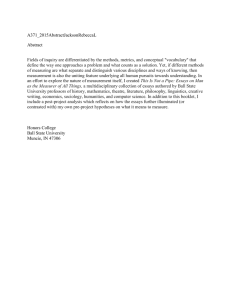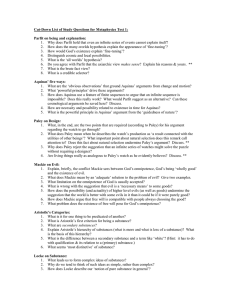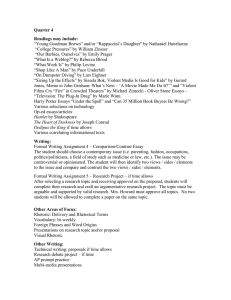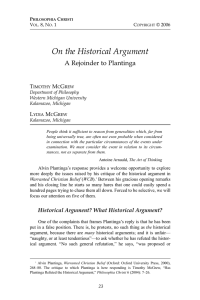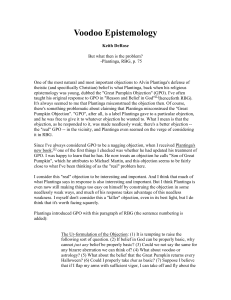Sample Syllabus Philosophy 116 Philosophy of Religion S. Miceli
advertisement
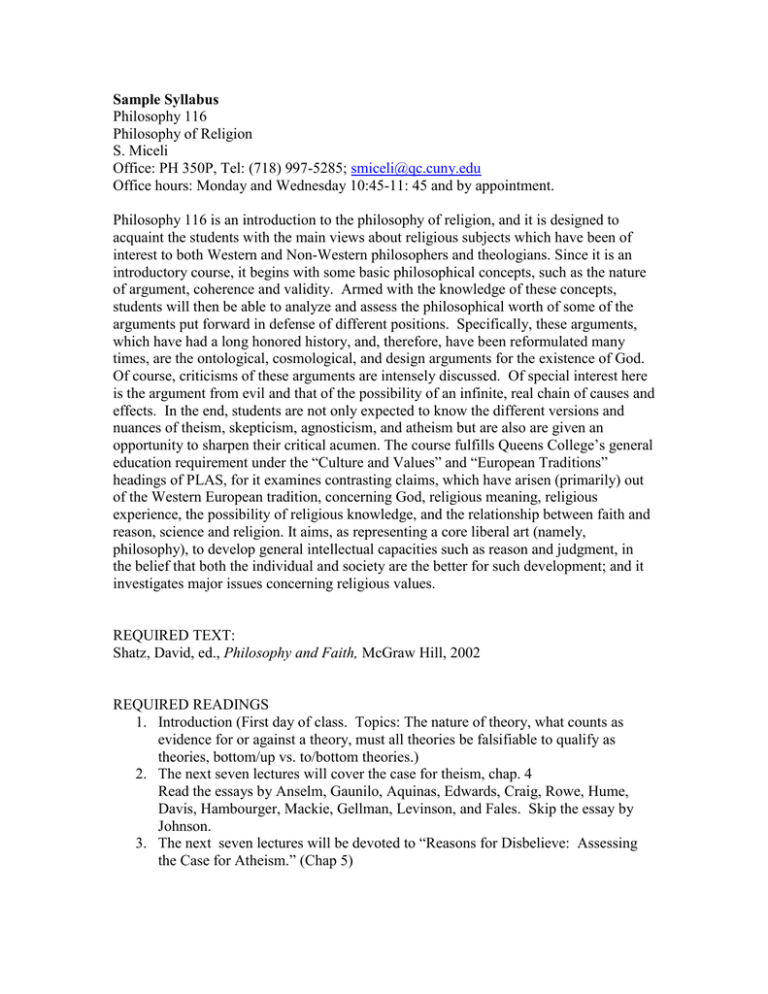
Sample Syllabus Philosophy 116 Philosophy of Religion S. Miceli Office: PH 350P, Tel: (718) 997-5285; smiceli@qc.cuny.edu Office hours: Monday and Wednesday 10:45-11: 45 and by appointment. Philosophy 116 is an introduction to the philosophy of religion, and it is designed to acquaint the students with the main views about religious subjects which have been of interest to both Western and Non-Western philosophers and theologians. Since it is an introductory course, it begins with some basic philosophical concepts, such as the nature of argument, coherence and validity. Armed with the knowledge of these concepts, students will then be able to analyze and assess the philosophical worth of some of the arguments put forward in defense of different positions. Specifically, these arguments, which have had a long honored history, and, therefore, have been reformulated many times, are the ontological, cosmological, and design arguments for the existence of God. Of course, criticisms of these arguments are intensely discussed. Of special interest here is the argument from evil and that of the possibility of an infinite, real chain of causes and effects. In the end, students are not only expected to know the different versions and nuances of theism, skepticism, agnosticism, and atheism but are also are given an opportunity to sharpen their critical acumen. The course fulfills Queens College’s general education requirement under the “Culture and Values” and “European Traditions” headings of PLAS, for it examines contrasting claims, which have arisen (primarily) out of the Western European tradition, concerning God, religious meaning, religious experience, the possibility of religious knowledge, and the relationship between faith and reason, science and religion. It aims, as representing a core liberal art (namely, philosophy), to develop general intellectual capacities such as reason and judgment, in the belief that both the individual and society are the better for such development; and it investigates major issues concerning religious values. REQUIRED TEXT: Shatz, David, ed., Philosophy and Faith, McGraw Hill, 2002 REQUIRED READINGS 1. Introduction (First day of class. Topics: The nature of theory, what counts as evidence for or against a theory, must all theories be falsifiable to qualify as theories, bottom/up vs. to/bottom theories.) 2. The next seven lectures will cover the case for theism, chap. 4 Read the essays by Anselm, Gaunilo, Aquinas, Edwards, Craig, Rowe, Hume, Davis, Hambourger, Mackie, Gellman, Levinson, and Fales. Skip the essay by Johnson. 3. The next seven lectures will be devoted to “Reasons for Disbelieve: Assessing the Case for Atheism.” (Chap 5) Read the essays by Rowe, Alston, Stump, Swinburne, Murray, Xenophanes, Spinoza, Feuerbach, Freud, and Rowe. 4. The next eight lectures will deal with the interaction between science and religion: “Science, Nature, and Religious belief.” (Chap 6) Read the essays by Haught, Plantinga, Van Till, Van Inwagen, Audi, Swinburne, Van Inwagen, Alston, Hume, Van Inwagen, Mill, Johnson, and Griffith. 5. The rest of the semester will cover the topic of the relationship between faith and reason: “Is There a Place for Faith.” (Chap 7) Read the essays by Clifford, Van Inwagen, Plantinga, Golding, Lycan and Schlesinger, and James. Skip the other essays in this chapter. COURSE REQUIREMENTS: 1. A substantial paper of about ten to fifteen double-spaced pages. A paper of fewer pages will be acceptable. Students are encouraged not to hand in papers less than eight pages long. This should be given to the instructor on the last day of class but will be accepted also on the day of the final. 2. A final examination with topics provided on the last day of class. THE PAPER TOPIC: The topic of the paper should be chosen in consultation with the instructor. However, students ought to write on a topic they truly care about and, ideally, should reflect the readings done in the course and class discussion. Furthermore, try to focus on a central idea, and analyze and develop it with sustained arguments. For those students who find themselves at a loss for an idea the following topics are suggested for possible consideration: 1. Is God’s foreknowledge of human affairs compatible with human freedom? 2. Is the concept of God, as traditionally understood, compatible with the amount of evil in the world. 3. Is atheism intellectually satisfying? 4. Is God required as the basis for ethical justification? 5. Is the theory of evolution compatible with the traditional view about God’s nature? You may discuss any of these topics in the light of the thought of you favorite philosopher. For instance, in the past students have written on what Maimonides says about the names of God. Others have used Aquinas’s ideas to formulate their views on life after death. And still others have read some Sufi mystic to explain what life with God is like. Of course, there is always the option of a book report. This too must be approved by the instructor. If you do not have one in mind, then the following are good and not too difficult works to handle. 1. John Polkinghorne, Belief in God in an Age of Science, Yale. 2. Craig and Smith, Theism, Atheism, and Big Bang Cosmology, Oxford. 3. John F. Haught, After Darwin: A Theology of Evolution, Westview Press 4. John F. Haught, Christianity and Science, Orbis Books 5. Kai Nielsen, Atheism & Philosophy 6. Kai Nielsen, Ethics Without God, Prometheus Books 7. Richard Swinburne, The Coherence of Theism, Oxford. 8. Richard Swinburne, The Evolution of the Soul, Oxford. 9. Richard Dawking, The Blind Watchmaker: Historical and Contemporary Issues, Harper/SanFrancisco. 10. Howard Van Till, The Fourth Day: What the Bible and the Heavens Are Telling Us About the Creation, Grand Rapids. 11. C.S. Lewis, Miracles, MacMillan. 12. Thomas Owen, ed., God’s Activity in the World, Scholars Press. (Discuss at least three essays from this book.) THE FINAL: The final will consist of six essays. Sample questions. 1. William Lane Craig claims to have proven that the world is finite by employing both philosophical and scientific arguments. How do the proofs go? What would Aquinas say about the philosophical arguments? What about Edwards and Rowe? 2. In what way does Davis’s argument in “Fine Tuning: The New Design Argument” differ from Aquinas’s argument from design? Given what science tells us today, is God’s existence more “scientifically” acceptable. 3. Evan Fales writes about religious experience from an anthropologist’s points of view and claims that mystical experiences can be explained by the existence of a repressive environment in which the mystic lives. Do you agree with him? 4. Do Freud, Spinoza, and Feuerbach satisfactorily show that belief in God is the result of human need either for a father figure or for something else? 5. Is Religion opposed to science? Does evolution undermine belief in God? Why does Plantinga say that there is an opposition here? In what way do both Haught and Van Till try to bridge the gap that Plantinga believes exists between them? 6. If one believes in God, does one also need a rational justification for such a belief? Is one immoral if one believes something without hard evidence? What do Plantinga, Van Inwagen, and Clifford say about this?




